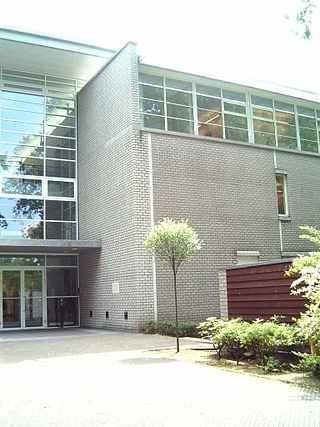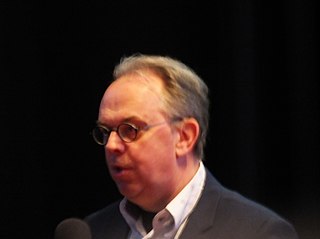Related Research Articles
Robert D. Van Valin Jr. is an American linguist and the principal researcher behind the development of Role and Reference Grammar, a functional theory of grammar encompassing syntax, semantics, and discourse pragmatics. His 1997 book Syntax: structure, meaning and function is an attempt to provide a model for syntactic analysis which is just as relevant for languages like Dyirbal and Lakhota as it is for more commonly studied Indo-European languages.

James Lloyd "Jay" McClelland, FBA is the Lucie Stern Professor at Stanford University, where he was formerly the chair of the Psychology Department. He is best known for his work on statistical learning and Parallel Distributed Processing, applying connectionist models to explain cognitive phenomena such as spoken word recognition and visual word recognition. McClelland is to a large extent responsible for the large increase in scientific interest in connectionism in the 1980s.
Bernard Sterling Comrie, is a British-born linguist. Comrie is a specialist in linguistic typology, linguistic universals and on Caucasian languages.
The Cognition and Brain Sciences Unit is a branch of the UK Medical Research Council, based in Cambridge, England. The CBSU is a centre for cognitive neuroscience, with a mission to improve human health by understanding and enhancing cognition and behaviour in health, disease and disorder. It is one of the largest and most long-lasting contributors to the development of psychological theory and practice.
Stephen C. Levinson FBA is a British social scientist, known for his studies of the relations between culture, language and cognition, and former scientific director of the Language and Cognition department at the Max Planck Institute for Psycholinguistics in Nijmegen, the Netherlands.
Philip Lieberman was a cognitive scientist at Brown University, Providence, Rhode Island, United States. Originally trained in phonetics, he wrote a dissertation on intonation. His career focused on topics in the evolution of language, and particularly the relationship between the evolution of the vocal tract, the human brain, and the evolution of speech, cognition and language.

The Max Planck Institute for Psycholinguistics is a research institute located on the campus of Radboud University Nijmegen in Nijmegen, Gelderland, the Netherlands. The institute was founded in 1980 by Dutch psycholinguist Pim Levelt and is dedicated exclusively to psycholinguistics. It is one of the few institutes of the Max Planck Society situated outside Germany. According to the ranking of Web of World Research Centers, the institute ranks second amongst all Max Planck Institutes (MPI) in terms of visibility and eighth in terms of size.
Ping Li is currently Sin Wai Kin Professor in Humanities and Technology, Chair Professor of Neurolinguistics and Bilingual Studies, and Dean of the Faculty of Humanities at the Hong Kong Polytechnic University (PolyU). Prior to joining PolyU, he was a Professor of Psychology, Linguistics, and Information Sciences and Technology, and Associate Director of the Institute for Computational and Data Sciences at Pennsylvania State University. His research interests are in language acquisition, bilingualism, and reading comprehension in both children and adults. He uses digital technologies and cognitive neuroscience methods to study neuroplasticity and individual differences in learning, so as to understand the relationships among languages, cultures, technology, and the brain. Li received a B.A. in Chinese linguistics from Peking University in 1983, an M.A. in theoretical linguistics from Peking University, a Ph.D. in psycholinguistics from Leiden University and the Max Planck Institute for Psycholinguistics in 1990, and completed post-doctoral fellowships at the Center for Research in Language at the University of California, San Diego and the McDonnell-Pew Center for Research in Cognitive Neuroscience in 1992. Li has been employed at the Chinese University of Hong Kong (1992–1996), the University of Richmond (1996–2006), and Pennsylvania State University (2008–2019), and he has also served as Program Director for the Perception, Action, and Cognition Program and the Cognitive Neuroscience Program at the National Science Foundation (2007–2009). Li was also President of the Society for Computation in Psychology and is currently Editor of Brain and Language, Elsevier and Senior Editor of Cognitive Science, Wiley. He is an elected Fellow of the American Association for the Advancement of Science (AAAS).
Melissa Bowerman was a leading researcher in the area of language acquisition. From 1982 to 2007, she was a senior research fellow at the Max Planck Institute for Psycholinguistics.
Elena Lieven is a British psychology and linguistics researcher and educator. She was a senior research scientist in the Department of Developmental and Comparative Psychology in Leipzig, Germany. She is also a professor in the School of Health Sciences at the University of Manchester where she is director of its Child Study Centre and leads the ESRC International Centre for Language and Communicative Development (LuCiD).

Josep Call is a Spanish comparative psychologist specializing in primate cognition.

Angela Friederici is a director at the Max Planck Institute for Human Cognitive and Brain Sciences in Leipzig, Germany, and is an internationally recognized expert in neuropsychology and linguistics. She is the author of over 400 academic articles and book chapters, and has edited 15 books on linguistics, neuroscience, language and psychology.

Willem Johannes Maria (Pim) Levelt is a Dutch psycholinguist. He is a researcher of human language acquisition and speech production. He developed a comprehensive theory of the cognitive processes involved in the act of speaking, including the significance of the "mental lexicon". Levelt was the founding director of the Max Planck Institute for Psycholinguistics in Nijmegen. He also served as president of the Royal Netherlands Academy of Arts and Sciences between 2002 and 2005, of which he has been a member since 1978.

Elizabeth Anne CutlerFRS FBA FASSA was an Australian psycholinguist, who served as director emeritus of the Max Planck Institute for Psycholinguistics. A pioneer in her field, Cutler's work focused on human listeners' recognition and decoding of spoken language. Following her retirement from the Max Planck Institute in 2012, she took a professorship at the MARCS Institute for Brain, Behaviour and Development, Western Sydney University.

Harold Bekkering is a Dutch professor of cognitive psychology at the Donders Institute for Brain, Cognition and Behaviour of the Radboud University Nijmegen. His research has covered many different ways of learning, ranging from basic sensorimotor learning to complex forms of social learning. Lately, he aims to implement knowledge about human learning in educational settings.
Sotaro Kita is a professor in the Department of Psychology at The University of Warwick. Kita's work focuses on the psycholinguistic properties of gestures accompanying speech, relations between spatial language and cognition, language development, and sound symbolism.
Asifa Majid is a psychologist, linguist and cognitive scientist who is professor of language, communication and cultural cognition at the University of Oxford, UK. She is the 2024 recipient of the Jeffrey L. Elman Prize for Scientific Achievement and Community Building, awarded by the Cognitive Science Society. In 2015 she won the Ammodo KNAW Award for fundamental research. In 2024 she was elected a Fellow of the British Academy.
Lorraine Komisarjevsky Tyler, is a British neuroscientist. She is Professor of Cognitive Neuroscience at the University of Cambridge.
Aslı Özyürek is a linguist, cognitive scientist and psychologist. She is professor at the Center for Language Sciences and the Donders Institute for Brain, Cognition and Behaviour at Radboud University Nijmegen, and incoming Director of the Multimodal Language Department of the Max Planck Institute for Psycholinguistics.

Peter Hagoort is a Dutch neuroscientist who studies the neurobiology of language.
References
- 1 2 3 4 5 6 Lois Reynolds; Tilli Tansey, eds. (2003). The MRC Applied Psychology Unit. Wellcome Witnesses to Contemporary Medicine. History of Modern Biomedicine Research Group. ISBN 978-0-85484-088-5. OL 21078807M. Wikidata Q29581668.
- ↑ "William Marslen-Wilson". The Royal Society . Retrieved 17 June 2017.
- ↑ "Professor William Marslen-Wilson, FBA — Cambridge Language Sciences". University of Cambridge. 22 February 2012. Retrieved 17 June 2017.